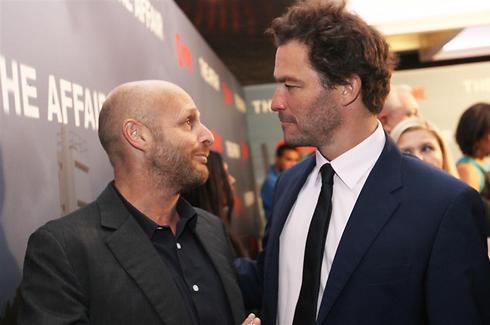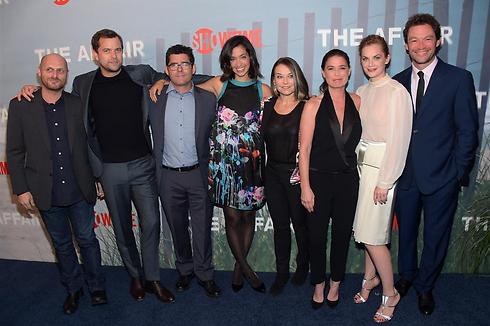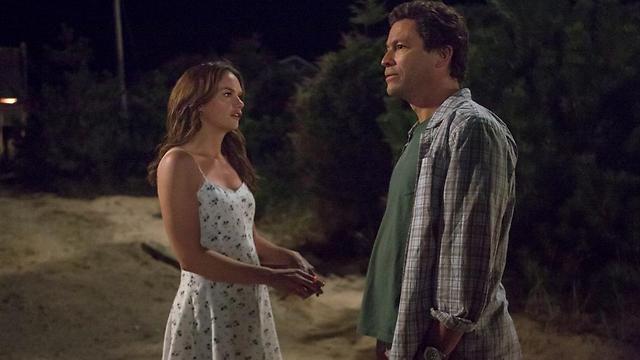
Israeli creator of 'The Affair' opens up to Ynet
Hagai Levi sits down with Ynet and explains why he left Hollywood despite critical success and what he is doing back in Israel.
Despite the compliments from critics and the Golden Globe nominations, Hagai Levi, the Israeli co- creator of Showtime’s “The Affair,” who became well-known for producing HBO's "In Treatment" based off of the Israeli original drama "Betipul" created by Levi, told Ynet that he is at peace with his decision to leave the production of the successful American drama series.
In an exclusive interview with Ynet, Levi says, "(The Affair) started out as art, and there was a specific moment when I started to recognize that it was moving away from that."

After leaving the production of “The Affair” – Levi says the show took a different path than the one he envisioned – the Israeli director, writer and producer returned to Israel to work on a new show for the Israeli cable network HOT.
Origins
At age 17, Hagai Levi knew two things – that he loved films and that he did not really love being religious.
In the religious Kibbutz in which he was raised, Kibbutz Sha’alvimm located between Jerusalem and Tel Aviv, Hagai held the position of the Kibbutz’s film screener. The job included the censorship of the films that were deemed too racey for the religious members of the community.
Levi, who had already stood out as a smart but skeptic student, would watch the films before they were screened and would block out the questionable scenes with paper - or blur them out of focus. How viewing those scenes affected his soft soul will never be known but its likely they prepared Levi for the far from modest scenes aired today on HBO and Showtime.
“Someone once told me that the people of the Kibbutz were actually saying, ‘We will sacrifice you, so you’ll watch those scenes,” Levi recalled during his interview with Ynet at a local café located in his Tel Aviv neighborhood.
“In the Orthodox world, they try to keep you in the beginning, but when they understand that you are skeptic – they give up on you and focus their efforts on preventing you from ruining the others."
Did it hurt your feelings?
“I don’t hold any grudges about it. Once, I did. I felt like they gave up on me then, that they rejected me. It’s true I wanted to take a swipe at the system, but I wanted to hit at it from within. I wanted to be the skeptic, the one who asks questions – I didn’t want to leave. It suited me to remain the outsider, and then they kicked me out. All of a sudden I had nothing to kick at. So what then? I was pretty lost,” says Hagai.
“I really struggled during my coming of age years. I tried to make change – I created a local paper with friends and we wanted to make a change. I had a moment where I understood that they (the Orthodox members of the Kibbutz) established that place. That’s the way they wanted it, that’s what they believe – if it doesn’t fit you – then leave! What do you want from them? I left full of anger and it took me many years to get over it. Today I really love them, they seem really cute to me.”
So if they wouldn’t have kicked you out, you would have stayed religious?
“There’s a chance I would have stayed, maybe I would have become a kind of modern Orthodox.”
Leaving 'The Affair'
Years later, after Hagai remarried and became the father of two, Levi has abandoned another secure yet determined sect – the American television industry.
After the success of “In Treatment” on HBO, based on Hagai’s Israeli show Betipul, his next idea – “The Affair” (the last episode aired Thursday night on HOT) got put on the fast track to American television screens with actors such as Dominic West (from HBO’s The Wire) and Ruth Wilson (from BBC’s Luther).
Levi wanted to investigate the subject of romantic betrayal in a manner inspired by the 1950 film Rashomon, which is known for its plot device which includes several characters offering alternative, self-serving and contradictory versions of the same event.
Levi accepted an offer to produce the show in the US with Sarah Treem, who had worked with Levi on “In Treatment.”
When production of the show got into high gear, Levi realized that his vision for the show was changing before his very eyes and decided to leave and return to Israel to put his energy into the Israeli show “Cursed” on the HOT network.
You once said that there are things that you do for money, and things that you do for art, and that you feel whole doing both as long as you are aware what is what.
“Correct. And in 'The Affair' it wasn’t clear. It started out as art, and there was a specific moment where I started to identify that it was distancing away from that, and if the answer to the question ‘Why am I doing is this?’ is foggy, I’m left in the position of frustration and confusion – saturated denials. Not a good place.”
If they would have said to you from the beginning – come make a series, "The Affair," you’ll get a lot of money and it will be commercial…
"I wouldn’t do it. And I say this from experience, because there were many times where I received those kinds of offers, and I always feel like it won’t work out for me. I did it a long time ago with Telenovelas – there it's really about using connections. But passion is needed in order to lead something. You have to build a mountain. And if I’m not convinced deep inside, I’ll simply…go to sleep.”
“For me the impulse is to go to sleep. I go to sleep whenever I want, sleep calls me – it’s a weight. Because of this I write here (the café), something about the fact that there are people around me forces me to work. Look, giving up was a difficult and sad moment. Today after the whole round I say to you – many people love it (The Affair), including people I love, and I understood little by little that if I were to watch the show from the side, then I would think it’s a great show, but because I see it only from the point of view of what I would have done with it compared to something else – I have a kind of difficulty.”
What remained from the original idea?
“I wanted the show to focus on the two heroes, because I’m personally tired of shows that have several heroes and cross over between several stories. And there really is no scene in the show that doesn’t include one of them. It was also important to me that the betrayal would not be from a bad marriage.”
But betrayal always comes from a place of something lacking in the relationship.
“Yes, but not from a marriage that is coming apart or really horrible, but from a good family, a stable one. People who, all in all, love one another.”
So why?
“The idea is that there is something bigger than you that grabs you from the outside.”
Fate?
“Or maybe sex, or in general what is known as falling in love. The investigation within the show is about falling in love, and how when everything is over, you, in fact, are left in the same place. I always had the image of that scene at the end of “The Graduate,” where they are sitting and looking at one another – and what now? We’ve done all of this, but what now? It’s no longer that crazy love, and you lost everything.”
You’re with the person you love.
“You were also with the person you love before.”
So what is the conclusion?
“That at some point it’s more of a decision than an impulse. A decision of what is really important to you in life, and not just in relation to betrayal. As someone who was married and got divorced, I understand that it’s work, and that it’s an internal decision and a way of life more than an impulse. That thing that takes you over, you can control it.”
“'The Affair' which included elements such as a corpse, a police investigation and a lot of sex was aired on the US Showtime network and was received with a bear hug by critics in the US. The show received three nominations in the 2015 Golden Globes awards – one for best drama, and the two other nominations for best actor and actress (West and Wilson)."
Levi, who characterizes himself as someone who is constantly battling narcissism, is pleased but not going wild. For all he is concerned, success will be measured by having signed his next contract with his artistic freedom included.
Reaching audiences
“I don’t have the ambition to reach a lot of people. “In Treatment” was seen by very few people in America. In the entire 20 versions that were made, it appealed to few people, and for me that is always enough - definitely. It never interested me to reach more than that. As far as I’m concerned “Betipul” was a much more esoteric show than “Cursed.”It was born as a show for friends – really. The whole idea was, ‘this won’t cost you anything, let me make a show,'’’ says Levi.
“There was hype. That there was. But when you check how many people physically watched it – it’s not a lot. Definitely not when compared to the other daily dramas. In the US, there were a couple thousand people who were addicted to it and that was enough to keep it going, and that’s what’s fun about the US, that it’s so big that even a small amount of viewers is enough for three seasons,” says Levi.
Did the Americans also think that it would appeal to a small amount of people?
“Their consideration does not work that way, but it’s a fact that they did not try to commercialize it. Everyone said there was no chance they would leave ‘In Treatment’ the way it was. That they would cut it, bring helicopters into the sky, and no, they left it the way it is.”
So basically “The Affair” was the first time you dealt with a system that does bring in those helicopters.
“Exactly. And I have no ability to deal with this system. I do not know how to make a show that will bring in a lot of viewers. I don’t have those instincts and I don’t have the motivation for it and I don’t have the nerves for it. I know what is good and what is not good, not what will bring (in viewers) and what won’t. My ideas are weird from the beginning. They don’t need money and don’t make money.”
Levi’s next project that will skip out on the concept of financial success is an adaptation of a diary written by Esther "Etty" Hillesum, a New Yorker who lived in Amsterdam in the beginning of the ‘40s.
The project is about the spiritual process Hillesum ventured into while undergoing therapy with a charismatic and courageous psychiatrist. Hillesum began the treatment as someone neurotic, and left it an enlightened woman and full of compassion for the universe. In the middle, the Holocaust took place. Levi is now trying to adapt the diary into a film, after, as Levi says, he used up all of his TV credit with the avant-garde and experimental project “Cursed.”
“(Hillesum) is not well recognized, maybe because Anne Frank kind of took over the niche. ‘There is only a spot for one Dutch diary from the Holocaust, why are you trying to push your way in?’” Levi joked.” But the spiritual journey she goes through is magical. And at the end what she realizes is that the situation does not matter – I am a free person. Even in the gas chamber, I have the ability to decide. To get to a place where you are not reliant on anything. To get rid of narcissism, of ego, and to understand that you are not reliant on anything is the ultimate freedom, no?”
In past interviews you talked about your panic attacks. Do they still occur?
“Today they are no longer part of my life, but they still lurk – I feel them once in a while. It started when I lost faith, and you are always scared it’s going to happen, so you avoid millions of things and limit your life and try to always control it. And you can’t. I still have reminders of them during flights – I have a serious fear of flying. I take to two Clonex before each flight. My fear is not that something will happen, rather that I’ll have an attack during the flight, and I won’t be able to get out of (the plane). I never go into a Subway, for example.”
How do the panic attacks relate to you losing your faith?
"I think that during that period they created a new set of rules. I didn’t walk alone at night, I didn’t do a whole bunch of things. My life was limited in a way that changed the rules of my previous life."
So you are in a sense still committing mitzvot (good deeds)?
"I now feel that the rituals were replaced with a different system that is more constructive and more real, where I ask what is good and what is right, and still, with every project I have a moment of…I give up on it (the project), or worse – I realize I can’t give up on it, and that is horrible. A month before filming I know that there is nothing worse than what I am doing and that it’s not worth anything and I’m not worth anything, but there is no way out and I start to function like a robot.”
You’re not exactly in a position where you can judge.
"Right, but I judge anyway. And because a lot of times I do things that do not follow the beaten path, I don’t have that voice that says – it already worked, it’s a genre. It will work. I’m not trying to preserve success. In that sense, I’m lucky because I know that attempts to preserve success are destined to fail – a huge and disastrous failure."












